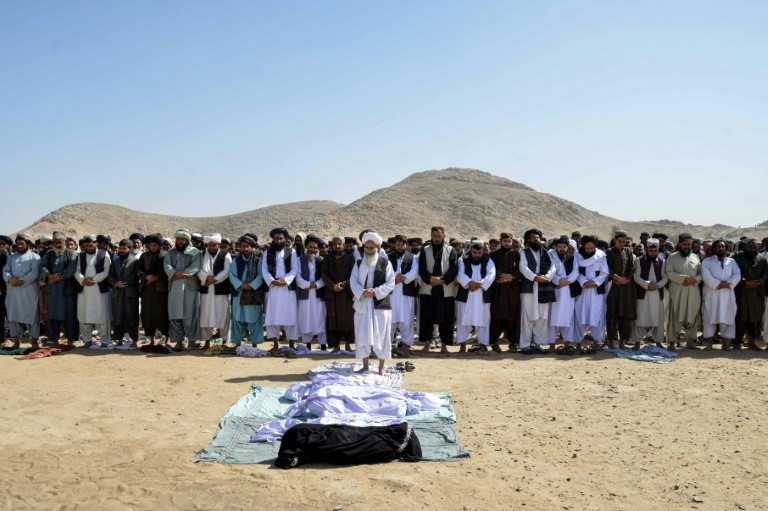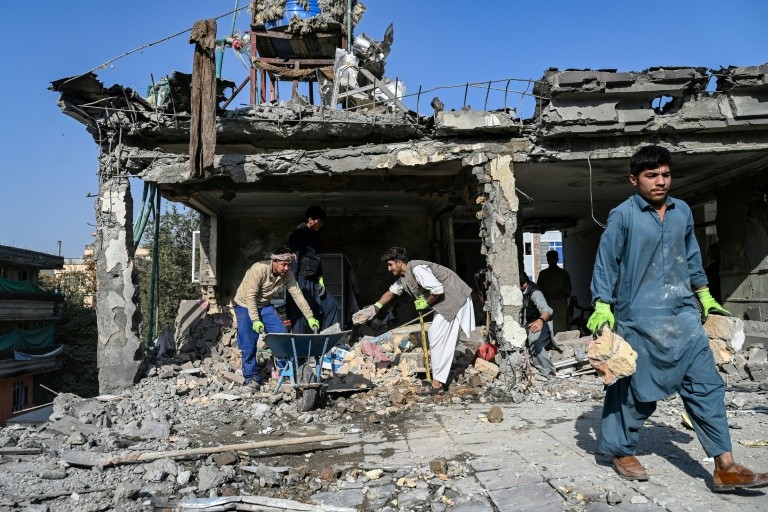
Pakistan launched strikes on Afghan soil late Friday, killing at least 10 people and breaking a ceasefire that had brought two days of calm to the border, officials told AFP.
The 48-hour truce had paused nearly a week of bloody border clashes that killed dozens of troops and civilians on both sides.
"Pakistan has broken the ceasefire and bombed three locations in Paktika" province, a senior Taliban official told AFP, speaking on condition of anonymity. "Afghanistan will retaliate."
Ten civilians were killed and 12 others wounded in the Pakistani strikes, a provincial hospital official told AFP on condition of anonymity, adding that two children were among the dead.
The Afghanistan Cricket Board told AFP that eight players who were in the region for a tournament were killed.
The cross-border violence had escalated dramatically from Saturday, days after explosions rocked the Afghan capital Kabul, just as the Taliban's foreign minister began an unprecedented visit to India, Pakistan's longtime rival.
The Taliban then launched an offensive along parts of its southern border with Pakistan, prompting Islamabad to vow a strong response of its own.
When the truce began at 1300 GMT on Wednesday, Islamabad said that it was to last 48 hours, but Kabul said the ceasefire would remain in effect until Pakistan violated it.
Pakistan's Defence Minister Khawaja Muhammad Asif accused Kabul of acting as "a proxy of India" and "plotting" against Pakistan.
"From now on, demarches will no longer be framed as appeals for peace, and delegations will not be sent to Kabul," Asif wrote in a post on X, before news of the fresh strikes emerged.
"Wherever the source of terrorism is, it will have to pay a heavy price."
Taliban government spokesman Zabihullah Mujahid said its forces had been ordered not to attack unless Pakistani forces fired first.
"'If they do, then you have every right to defend your country'", he said in an interview with the Afghan television channel Ariana, relaying the message sent to the troops.
Security issues are at the heart of the tensions, with Pakistan accusing Afghanistan of harbouring militant groups led by the Tehreek-e-Taliban Pakistan (TTP) -- the Pakistani Taliban -- on its soil, a claim Kabul denies.
"Pakistan has repeatedly shared its concerns" related to the presence of militant groups operating from Afghan soil, Pakistani foreign office spokesman Shafqat Ali Khan said in a weekly press briefing Friday.
"Pakistan expects concrete and verifiable actions against these terrorist elements by the Taliban regime."
Just before the truce ended, seven Pakistani paramilitary troops were killed in a suicide bombing and gun attack at a military camp in the North Waziristan district that borders Afghanistan, an administration official told AFP.
A faction of the TTP claimed responsibility for the attack.
Earlier on Friday, Afghans in the frontier town of Spin Boldak -- where the fighting had been particularly intense -- described scenes of normalcy.
"Everything is fine, everything is open," Nani, 35, told AFP.
"I'm not afraid, but everyone sees things differently. Some say they're going to send their children elsewhere as the situation isn't good, but I don't think anything will happen," said Nani, who did not give a surname.
The United Nations Assistance Mission in Afghanistan said 37 people were killed and 425 wounded on the Afghan side of the border, calling on both sides to bring a lasting end to hostilities.
An AFP correspondent in Spin Boldak said they saw hundreds of people attending funerals on Thursday, including for children whose bodies were wrapped in white shrouds.
"People have mixed feelings," Nematullah, 42, told AFP. "They fear that the fighting will resume, but they still leave their homes and go about their business."
Calm had also returned to Kabul, where new explosions rang out shortly before the ceasefire announcement on Wednesday.
Nobody claimed responsibility for the blasts, but Pakistani security sources said they had undertaken "precision strikes" against an armed group in the Afghan capital.
Sources in Afghanistan suggested that Pakistan was behind at least one of the blasts and that they were air strikes, but the government has not formally accused Islamabad.









